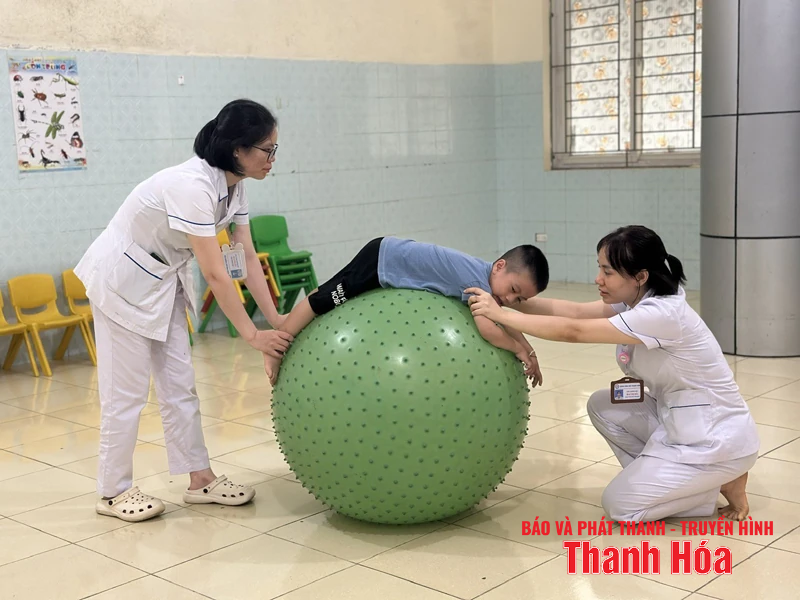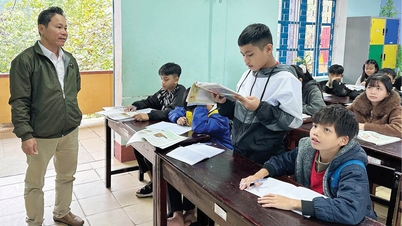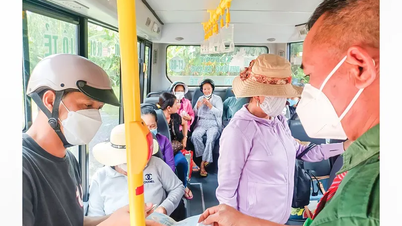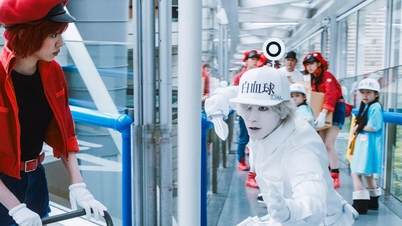Nurses and technicians at the Mental Health Unit practice physical therapy with children.
Being here in the morning, there is no smell of alcohol or medicine, but a gentle, peaceful feeling. Each child completes their therapy exercises without any shouting, scolding or pressure, only gentle words, gestures and patience, waiting for their progress.
In the occupational therapy room, nurse Mai Thi Hai patiently helps a 4-year-old boy practice exercises. His timid steps on the ladder are encouraged by the nurse: “one, two... very good”. The boy purses his lips, sweat beading on his forehead, but his eyes shine with effort. When he reaches the end of the line without falling, both she and the boy smile.
Talking to nurse Mai Thi Hai, we learned that she has been working at the Mental Illness Unit for 5 years. To work here, she not only goes to school to gain knowledge and skills to accompany children, but also has to practice perseverance and patience. Ms. Hai shared: “The children who come here are all “special pieces”. Some children do not speak, do not look into the eyes of others. Some children scream and run around all day. Some children just sit in a corner, not communicating with anyone. Each child has their own expression and personality. To accompany the children requires not only love and understanding, but also a lot of time and patience.”
Sharing about the joy of her job, nurse Hai said: “Baby NQT, born in 2019, entered the unit about 3 years ago. When he entered, he was diagnosed with slow development, did not understand words, showed signs of running and screaming a lot, and had reduced attention. Overcoming the initial difficulties, he and I have accompanied each other for a long time. From the joy when he spoke and understood single words to daily communication sentences. And now he is ready to enter first grade. Seeing him confident, the family is happy, I am also very happy”.
In the speech therapy room, technician Nguyen Thi Tung Lam patiently talks and guides the children. The letter cards, picture cards or models are repeated enough for the children to remember, imitate and follow. Occasionally, nurse Lam gently reminds the children to concentrate and sit properly. Technician Lam shares: "Children with slow development, autism, have very limited concentration and memory. Therefore, when teaching children, we need to be patient, have appropriate methods and repeat many times for the children to remember."
Sharing about how to accompany children, technician Lam shared: “Not only instructing children on skills and exercises, nurses and technicians always give them love and care through gestures and attitudes. Each nurse must always learn how to adjust themselves to suit each child; become a spiritual support for children to trust, feel secure and be able to open up and participate in activities.”
Doctor CK 1 Tran Thi Minh Anh, Deputy Head of the Department of Neuropsychiatry, in charge of the Mental Illness Unit, said that every day the unit consults and examines 30-40 children; treats about 120-140 children with developmental delays, autism and various disorders. To accompany the children, the doctors, nurses and technicians in the unit determine that each person is always gentle, patient, sympathetic and loving to the children. From there, they become friends, second mothers who understand the children's thoughts, feelings, personalities and development.
When accompanying children, doctors, nurses, and technicians are always patient and closely follow the needs and emotions of children. In particular, they must always restrain themselves and be gentle with children in all situations, helping them regulate their emotions and overcome disorders. Just one angry emotion or action will make children uncooperative and react negatively, making the condition worse.
Many children with developmental delays, severe autism, and intellectual disabilities and many disorders are relatively difficult to approach. Sometimes, moments of disorder make children run around, scream, and tend to be violent towards themselves and others. In such situations, the teachers always talk gently and use therapy to help the children overcome.
Along with becoming a companion to children, doctors and nurses also regularly promote and encourage families and relatives to understand the child's illness and take the child for regular treatment. At the same time, they advise and guide how to care for and teach children at home. Encourage parents and caregivers to regularly connect with doctors, nurses and technicians to promptly grasp the child's situation. Because, when parents do not hide, they accept the truth about their children, they understand, accompany and love them properly, then the child's journey will be effective.
Article and photos: Thuy Linh
Source: https://baothanhhoa.vn/ngoi-nha-thu-hai-cua-tre-dac-biet-256808.htm








![[Photo] General Secretary To Lam receives the Director of the Academy of Public Administration and National Economy under the President of the Russian Federation](/_next/image?url=https%3A%2F%2Fvphoto.vietnam.vn%2Fthumb%2F1200x675%2Fvietnam%2Fresource%2FIMAGE%2F2025%2F12%2F08%2F1765200203892_a1-bnd-0933-4198-jpg.webp&w=3840&q=75)









































































































Comment (0)